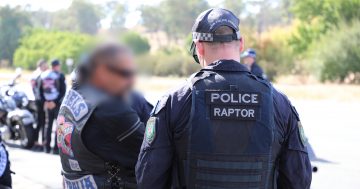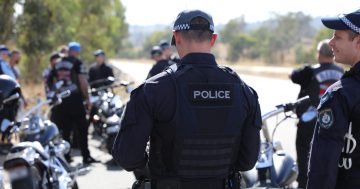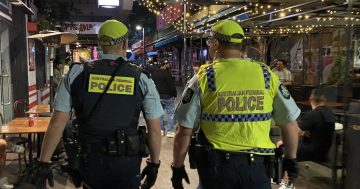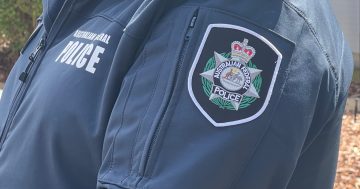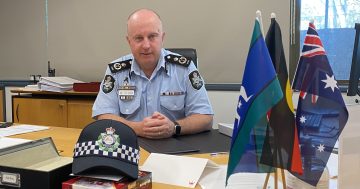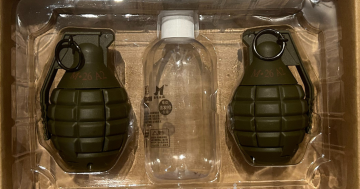Simon Corbell has announced he’s going to prepare a report on the Outlaw Motor Cycle Gang problem that is about to engulf us unless we move fast.
- Development of the report will also the assist the Government on national discussions on this issue, particularly the next meeting of Commonwealth, State and Territory Attorneys General which will be held in Canberra in April this year.
The Government proposes to provide the report to the Assembly by the last sitting in June.
For the Liberals Jeremy Hanson has been driving the issue with his latest media release:
- “Meanwhile the weak and indecisive Police Minister continues to dither on this issue and offer a timid ‘wait and see’ approach.
“It is clear that those tasked with enforcing our existing laws require additional powers to disrupt and dismantle serious and organised crime networks and have made unambiguous representations to that effect.
This has been prompted by a letter from the Australian Federal Police Association to Hanson (text below).
The real issue here is not the current OMCG problem (not to be confused in any way with other people who ride motorcycles) but what would happen if we fell out of step with surrounding NSW. Until NSW acts it’s a non-issue, but if we were to be left behind the risks, as voiced by the AFPA would be huge.
Text of the AFPA letter below:
- 31 March 2009
Dear Mr. Hanson,
The Australian Federal Police Association (AFPA) strongly concurs with a number of points that you made in your press release dated 26 March 2009. The AFPA is seeking a bipartisan approach by the Australian Capital Territory (ACT) Government and Opposition in relation to the enactment of specific organised crime legislation to address the deficiencies within current ACT legislation.
The ACT is at risk of becoming an oasis for organised crime syndicates including, but not limited to Outlaw Motor Cycle Gangs (OMCGs), if we fail to follow NSW’s lead to enact tougher & specific organised crime legislation.
Organised crime poses significant challenges to the criminal justice system. The criminal law and law enforcement are traditionally designed to prosecute and punish isolated crimes committed by individuals. The structure and modus operandi of criminal associations, however, do not fit well into the usual concept of criminal liability. Moreover, it is difficult to hold directors and financiers of organised crime responsible if they have no physical involvement in the execution of the organisations criminal activities. Equally, those who are only loosely associated with a criminal gang and provide support on an adhoc basis often fall outside existing concepts of accessorial liability.1
Australia is a signatory to the Convention against Transnational Organised Crime. As such, there is an obligation on the ACT Government to have laws that can effectively combat transnational and organized crime. The new laws in South Australia are designed to disrupt and dismantle organized crime groups including OMCGs.
At the November 2007 Ministerial Council for Police and Emergency Management-Police (MCPEMP) meeting each jurisdiction agreed to ‘review its legislation pertaining to the disruption and dismantling of serious and organized crime and consider enacting complementary and harmonized legislation to achieve this outcome’.2
The Australian Crime Commission has stated that OMCGs are one of the most visible groups in the organised crime landscape. Further, that they present a significant threat to law and order at a jurisdictional level and have national and international links that will ensure that they feature in any list of high risk crime groups for the foreseeable future.3
In Australia OMCGs are involved in numerous and continuous criminal activities including the organized theft and re-identification of motor vehicles; illicit drug manufacture; importation of illicit drugs and importation of precursor drugs; distribution of illicit drugs; murder; fraud; vice; extortion, blackmail; assaults and other forms of violence; public disorder; firearms offences; and money laundering. They continue to intimidate and threaten the public safety and profit from crime.4
Police have seized from premises connected with OMCGs fully automatic assault rifles, thousands of rounds of ammunition, ballistic vests, and a range of prohibited and dangerous weapons (including double edged knives, stun guns disguised as mobile phones and knuckle dusters).5
The South Australian Government advises that the effect of the South Australian reform program has seen displacement interstate of some members of criminal groups that could be targeted by South Australia’s new laws. Displacement of this kind may continue to occur in order to evade the reach of the legislation.6
The Australian Crime Commission has also given an opinion that ‘anticipating legislation that will effectively outlaw OMCGs in South Australia, there are indications that some outlaw groups have already relocated to other jurisdictions’.7
The NSW Government, NSW Police Force and the NSW Crime Commission have stated that a key area for improving the national response to organised crime groups would be closing legislative gaps between jurisdictions which can be exploited by increasingly sophisticated crime syndicates.8
The AFPA has no doubt that if NSW enacts amendments in line with the South Australian organised crime legislation, that organised crime, including OMCGs, will be further displaced and that the ACT, being located half way between Adelaide and Sydney, will be a safe haven for organized crime without specific organised crime fighting legislation.
Yours sincerely,
Jon Hunt-Sharman
Australian Federal Police Association
—
1 Dr Andreas Schloenhardt University of Queensland TC Beirne School of Law 4 April 2008
2 Letter from the NSW Minister for Police Mr David Campbell MP dated 19 May 2008 pg 1
3 Australian Crime Commission submission to the Inquiry into the legislative arrangements to outlaw serious and organized crime groups pg 9
4 Submission of the Government of South Australia to Australian Crime Commission Parliamentary Joint Committee June 2008 pg 16
5 Ibid pg19
6 Ibid pg 46
7 Australian Crime Commission submission to the Inquiry into the legislative arrangements to outlaw serious and organized crime groups pg 10
8 Letter from the NSW Minister for Police Mr. David Campbell MP dated 19 May 2008 pg 2













